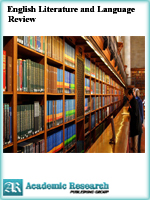English Literature and Language Review
Online ISSN: 2412-1703
Print ISSN: 2413-8827
Print ISSN: 2413-8827
Quarterly Published (4 Issues Per Year)

Archives
Volume 6 Number 7 September 2020
The Influence of Linguistic Landscape on English Learning: A Case Study of Shenzhen City
Authors: Woanjing Li ; Xiaolong Fu ; Qianying He ; Jing Lu
Pages: 119-132
DOI: doi.org/10.32861/ellr.67.119.132
Abstract
As an open social recourse and special language text, linguistic landscape, visibility and salience of languages on public and commercial signs in a given territory or region Landry and Bourhis (1997), and presented on various signs or billboards publicly, can be used as a useful recourse in language learning. Shenzhen, the first Chinese special economic zone, has developed into a fast-growing innovative city. Compared to other cities, Shenzhen has more frequent communications with worldwide visitors. Therefore, its education should be more international and advanced, especially English learning, since English, the most widely used language, is being used in linguistic landscapes increasingly. However, nowadays tedious English learning content and learning methods are unable to meet training requirements of students’ English level in society. Therefore, considering the significance of linguistic landscape in humanities construction and English learning, the government and schools give great importance to the construction of campus linguistic landscape. Through reference to representative research literatures and comparative analysis, this study intends to explore the importance of linguistic landscape in English learning by analyzing differences in campus linguistic landscape between middle schools and universities within Shenzhen from the form and content by introducing the way in which linguistic landscape is presented. And different purposes of its application are introduced in order to understand the application and design of linguistic landscape in different campuses more comprehensively. The research also explores the influence of campus linguistic landscape on students’ English learning, from the perspective of informal environmental penetration, learning material, stirring interest, broadening vocabulary and knowledge and its close relationship with life. This paper adopts the Constructivist learning theory of Piaget (1970). Students establish knowledge about the external world in the process of interaction with the surrounding environment to develop their cognitive structure. This paper concludes that the integration of linguistic landscape can benefit from its educational function to conduct a practice-oriented, teacher-led and student-centered pattern of English learning and improve students’ English learning ability.
A Rewriting Theoretic Approach to Ken Liu’s Translation of Folding Beijing
Authors: Chen Yingxuan
Pages: 110-118
DOI: doi.org/10.32861/ellr.67.110.118
Abstract
Given Folding Beijing’s great importance to Chinese science fictions after winning the 2016 Hugo Award for Best Novelette and Ken Liu’s active engagement in promoting modern Chinese literary works to go global, this paper endeavors to explain how the influences of ideology, poetics and patronage are displayed in Folding Beijing’s English translation from the perspective of Lefevere’s Rewriting Theory. Instead of focusing on the linguistic elements of the translation, the current study attempts to reveal the cultural, social, ideological, and poetical effects on the translator’s decision-making process and tries to explore the reasons for the novelette’s success. It is believed that this paper can, to a certain extent, not only provide beneficial guidance for future practitioners in this translation field, but also offer some reference for the study of translation of Chinese contemporary science fictions.
English-Speaking Confidence among Malaysian Technical University Students: A Pilot Study
Authors: Sarala Thulasi Palpanadan ; Iqbal Ahmad ; Ros Eliana Ahmad Zuki ; Zulida Abdul Kadir ; Mazlan bin Aris
Pages: 105-109
DOI: doi.org/10.32861/ellr.67.105.109
Abstract
Speaking in English confidently is a challenging task but very crucial for university students. Graduates with good communication efficiency especially in the engineering field are greatly demanded in the current work industry. Performing confidently is not only important for scoring academic tasks but also to help expand the revenue of the companies at workplace. Thus, a pilot study was conducted to investigate the perceptions of a public technical university engineering undergraduates’ confidence level in speaking English. A mixed method design was employed where a survey and semi-structured interview were conducted for data collection. The participants were selected using purposive sampling method where a total number of 50 undergraduates provided valid responses to the online questionnaire and 5 undergraduates participated in the semi-structured interview. Descriptive statistics using Statistical Package for the Social Science Version 25.0 (SPSS version 25.0) and thematic analysis were adopted for data analyses. The results revealed three main areas that were identified as important to build the students’ confidence in speaking: applying manual skills, familiarization of vocabulary and correct usage of grammar. The findings also highlighted that the participants felt that more public speaking practices should be provided to them to improve their confidence level further in speaking English fluently.



